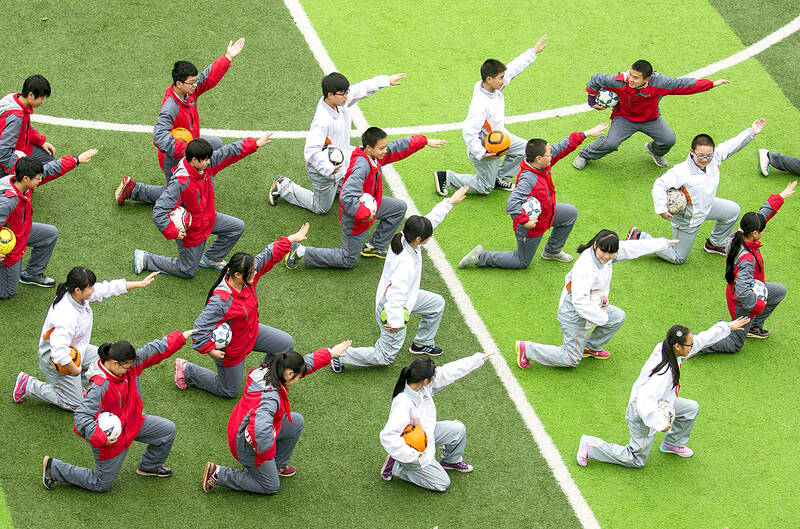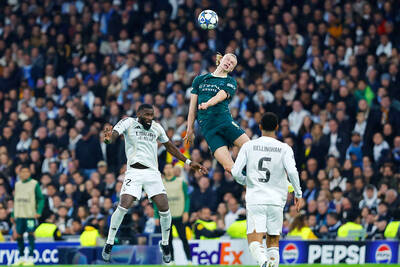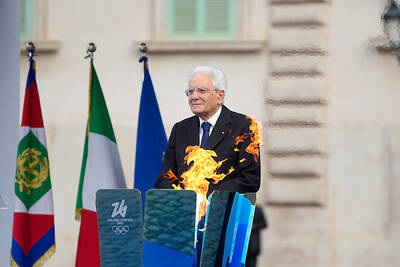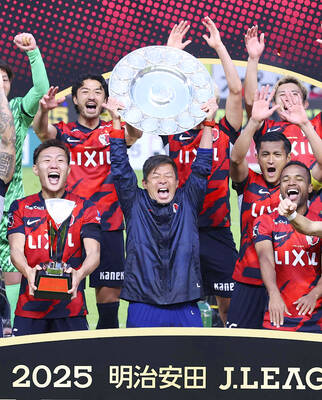In April, Chinese President Xi Jinping visited a company that makes humanoid robots. There he floated an idea to fix the country’s woeful men’s soccer team.
“Can we have robots join the team?” Xi was quoted as saying on the Web site of Zhiyuan Robotics.
It might be too late. China will be out of FIFA World Cup qualifying if it fails to beat Indonesia today. Even a victory might only delay the departure.

Photo: AP
What is the problem? China has 1.4 billion people, the globe’s second-largest economy and won 40 Olympic gold medals last year in Paris to tie the US. Why can it not find 11 elite men’s soccer players?
The government touches every aspect of life in China. That top-down control has helped China become the largest manufacturer of everything from electronics to shoes to steel.
It has tried to run soccer, but that rigid governance has not worked.
“What soccer reflects is the social and political problems of China,” said Zhang Feng, a Chinese journalist and commentator. “It’s not a free society. It doesn’t have the team-level trust that allows players to pass the ball to each other without worrying.”
Zhang said that politics has stalled soccer’s growth. There is added pressure since Xi is a big fan and has promised to resuscitate the game at home. Soccer is a world language with its “own grammar,” and China does not speak it, Zhang said.
“In China, the more emphasis the leader places on soccer, the more nervous the society gets, the more power the bureaucrats get, and the more corrupt they become,” Zhang added.
After China defeated Thailand 2-1 in 2023, Xi joked with then-Thai prime minister Srettha Thavisin, saying: “I feel luck was a big part of it.”
The consensus is clear. China has too few quality players, too much political interference from the Chinese Communist Party (CCP), and there is too much corruption in the local game.
Wang Xiaolei, another prominent Chinese commentator, said that soccer clashes with China’s top-down governance and the emphasis on rote learning.
“What are we best at? Dogma,” Wang wrote in a blog last year. “But football cannot be dogmatic. What are we worst at? Inspiring ingenuity and cultivating passion.”
The latest chapter in China’s abysmal men’s soccer history was a 7-0 loss last year to geopolitical rival Japan.
“The fact that this defeat can happen and people aren’t that surprised — despite the historical animosity — just illustrates the problems facing football in China,” said Cameron Wilson, a Scot who has worked in China for 20 years and written extensively about the game there.
China has qualified for only one men’s World Cup. That was 2002 when it went scoreless and lost all three matches. Soccer’s governing body FIFA places China at No. 94 in its rankings — behind war-torn Syria and ahead of No. 95 Benin.
For perspective: Iceland is the smallest country to reach the World Cup. Its latest population estimate is almost 400,000.
The Web site Soccerway tracks global soccer and does not show a single Chinese player in a top European league. The national team’s best player is forward Wu Lei, who played for three seasons in Spanish La Liga for RCD Espanyol. The club’s majority owner is Chinese.
The 2026 FIFA World Cup would have a field of 48 teams, a big increase on the 32 in 2022, yet China still might not make it.
China will be eliminated from qualification if it loses to Indonesia. Even if it wins, China must also beat Bahrain on Tuesday next week to have any hope of advancing to Asia’s next qualifying stage.
Englishman Rowan Simons has spent almost 40 years in China and gained fame doing television commentary in Chinese on English Premier League matches. He also wrote the 2008 book Bamboo Goalposts.
China is benefiting from reforms over the past decade that placed soccer in schools, but Simons said that soccer culture grows from volunteers, civil society and club organizations, none of which can flourish in China, as they are possible challengers to the rule of the CCP.
“In China at the age of 12 or 13, when kids go to middle school, it’s known as the cliff,” he said. “Parents may allow their kids to play sports when they’re younger, but as soon as it comes to middle school the academic pressure is on — things like sport go by the wayside.”
To be fair, the Chinese women’s team have done better than the men. China finished runner-up in the 1999 FIFA Women’s World Cup, but has faded as European teams have surged with built-in expertise from the men’s game. Spain won the 2023 Women’s World Cup. China was knocked out early, battered 6-1 by England in group play.
China has been successful targeting Olympic sports, some of which are relatively obscure and rely on repetitive training more than creativity. Olympic team sports such as soccer offer only one medal. So, like many countries, China focuses on sports with multiple medals. In China’s case they are diving, table tennis and weightlifting.
“For young people, there’s a single value — testing well,” Zhang said. “China would be okay if playing soccer were only about bouncing the ball 1,000 times.”
Li Tie, the national team coach for about two years beginning in January 2020, was last year sentenced to 20 years in prison for bribery and match-fixing. Other top administrators have also been accused of corruption.
The graft also extended to the Chinese Super League. Clubs spent millions — maybe billions — on foreign talents backed by many state-owned businesses and, before the collapse of the housing boom, real-estate developers.
The poster child was Guangzhou Evergrande. The eight-time Super League champions, once coached by Italian Marcello Lippi, was expelled from the league and disbanded earlier this year, unable to pay off its debts.
Zhang said businessmen invested in professional soccer teams as a “political tribute” and cited Hui Ka-yan. The embattled real-estate developer financed the Guangzhou Evergrande Football Club and used soccer to win favor from politicians.
Property giant Evergrande has amassed debts reported at US$300 billion, reflective of China’s battered property segment and the general health of the economy.
“China’s failure at the international level and corruption throughout the game, these are all factors that lead parents away from letting their kids get involved,” said Simons, who founded a youth soccer club called China Club Football FC.
“Parents look at what’s going on and question if they want their kids to be involved. It’s sad and frustrating,” Simons said.

The pressure was already on Real Madrid coach Xabi Alonso before their 2-1 defeat to Manchester City on Wednesday in the UEFA Champions League raised further questions about his future. Arsenal remain perfect in this season’s competition and three points clear at the top of the standings after a 3-0 win against Club Brugge, while defending champions Paris Saint-Germain were held 0-0 at Athletic Bilbao. The clash between Madrid and City was the standout game of the round amid reports this week that Alonso had lost control of the locker room. Speculation over his position is likely to intensify after the latest

‘HIGH STANDARD’: The Thunder are on track for a Finals-Cup double after they scored 22 three-pointers in equaling the best 25-game start to a season in NBA history The Oklahoma City Thunder on Wednesday bagged a 16th straight victory, thrashing the Phoenix Suns 138-89 to romp into an NBA Cup semi-final clash with the San Antonio Spurs, who stunned the Los Angeles Lakers 132-119. NBA Most Valuable Player Shai Gilgeous-Alexander scored 28 points to lead the reigning NBA champions Thunder, who improved to 24-1 to equal the best 25-game start to a season in league history. They dominated from start to finish to book their place in the final four of the in-season tournament in Las Vegas, where they are tomorrow to take on the Spurs. The New York Knicks and

The Olympic flame for the Milan Cortina Winter Games landed in Rome on Thursday following a handover in Greece. The flame was carried in a small lantern aboard an ITA Airways flight between the Greek and Italian capitals. Tennis player Jasmine Paolini — an Olympic gold medalist — and local organizing committee president Giovanni Malago carried the flame off the plane. “I feel honored. It’s an incredible emotion,” Paolini said in brief remarks before the lantern was driven away toward the presidential palace. A 63-day torch relay covering 12,000km is to start in Rome today and wind its way through all 110 Italian provinces

The Kashima Antlers won a record-extending ninth Japanese title on the final day of the J. League season yesterday, holding their nerve to beat the Yokohama F. Marinos 2-1. Watched by Brazilian legend and former player Zico, the Antlers went into the game at their packed home stadium with a one-point lead over Kashiwa Reysol in the table. A goal in either half from Brazilian striker Leo Ceara put the Antlers in control, but Yokohama struck in the first of five minutes of second-half injury time to set up a nail-biting finale, with Reysol winning their game 1-0. The Antlers saw out the